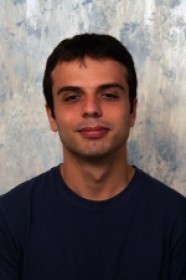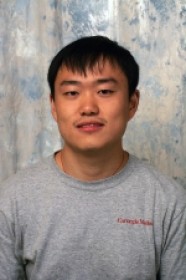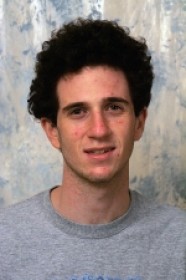PhD Thesis Defense
Detecting Object Instances Without Discriminative Features
Event Location: NSH 1305Abstract: In this thesis, we study the topic of detecting object instances which lack discriminative features in scenes with severe clutter and occlusions. Our work focuses on the three key areas: (1) objects that have ambiguous features, (2) objects where discriminative point-based features cannot be reliably extracted, and (3) occlusions. Current approaches [...]
Physics-Based Manipulation Planning in Cluttered Human Environments
Event Location: NSH 1305Abstract: This thesis presents a series of planners and algorithms for manipulation in cluttered human environments. The focus is on using physics-based predictions, particularly for pushing operations, as an effective way to address the manipulation challenges posed by these environments. We introduce push-grasping, a physics-based action to grasp an object first by pushing it and [...]
Representation, Planning, and Learning of Dynamic Ad Hoc Robot Teams
Event Location: GHC 8102Abstract: Forming an effective multi-robot team to perform a task is a key problem in many domains. The performance of a multi-robot team depends on the robots the team is composed of, where each robot has different capabilities. Team performance has previously been modeled as the sum of single-robot capabilities, and these [...]
Data-Driven Geometric Scene Understanding
Event Location: NSH 1305Abstract: In this thesis, we describe a data-driven approach to leverage repositories of 3D models for scene understanding. Our ability to relate what we see in an image to a large collection of 3D models allows us to transfer information from these models, creating a rich understanding of the scene. We develop [...]
Shape for Contact
Event Location: NSH 1305Abstract: Given a desired function for an effector, what is its appropriate shape? This thesis addresses the problem of designing the shape of a rigid end effector to perform a given manipulation task. It presents three main contributions: First, it describes the kinematics of an effector as the combination of both its [...]
Theory and Practice of Globally Optimal Deformation Estimation
Event Location: GHC 8102Abstract: Nonrigid deformation modeling and estimation from images is a technically challenging task due to its nonlinear, nonconvex and high-dimensional nature. Traditional optimization procedures often rely on good initializations and give locally optimal solutions. On the other hand, learning-based methods that directly model the relationship between deformed images and their parameters either [...]
Coordination of Multiple Dynamic Programming Policies for Control of Bipedal Walking
Event Location: NSH 3305Abstract: Walking is a core task for humanoid robots. Most existing walking controllers fall into one of two categories. One category plans ahead and walks precisely; they can place the feet in desired locations to avoid obstacles but react poorly to unexpected disturbances. The other category is more reactive; they can respond [...]
Search and Pursuit with Unmanned Aerial Vehicles in Road Networks
Event Location: NSH 1305Abstract: Across many rescue, surveillance, and scientific applications, there exists a broad need to perform wide-area reconnaissance and terrain surveys, for which unmanned aerial vehicles (UAVs) are increasingly popular. This thesis considers the task of using one or more UAVs to locate an object of interest, provide continuous viewing, and rapidly re-acquire [...]
Improving Robot Locomotion Through Learning Methods for Expensive Black-Box Systems
Event Location: NSH 3305Abstract: The modular snake robots in Carnegie Mellon’s Biorobotics lab provide an intriguing platform for research: they have already been shown to excel at a variety of locomotive tasks and have incredible potential for navigating complex terrains, but much of that potential remains untapped. Unfortunately, many techniques commonly used in robotics prove [...]








